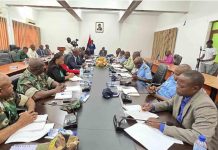Africa-Press – Angola. Gabriel Ndungu started fishing at the age of 15 and is now 38. He was born and lives in the municipality of Nzeto, province of Zaire. He has been fishing for over 15 years, with his father and some family members.
He goes to sea, usually at night, with his Yamaha motorboat, in the company of other colleagues.
Gabriel Ndungu stopped studying early and took up fishing, because he has to support his family and pays the school fees for his brothers and nephews, his sisters’ children, because his father no longer has the strength to work at sea.
As for catches, Gabriel Ndungu said that quantities vary. “When I spend three days on the high seas, I can bring ashore 500 kilos of fish, between small and large, sometimes even a ton, when we are blessed,” he said.
Fishing cooperative
By consensus of his companions, Gabriel Ndungu is responsible for a cooperative with 10 members.
The cooperative, he assured, has received support from the Ministry of Fisheries, the provincial government and the municipal administration. Support consists of boats and other fishing materials.
However, he said, calemas that occur from time to time in the Nzeto Sea damage boats and other materials, which sometimes causes the price of fish to rise. “The rise in fish is due to several factors and this is one of them”, he pointed out.
Dressed in shorts and an undershirt, Gabriel Ndungu revealed that he sometimes catches large fish that are popular with consumers, such as croaker, tuna and grouper. With a certain sadness, visible for a few minutes, Gabriel Ndungu recalled a few times that he had gone to sea for three to four days and returned to land empty-handed.
“The sea has those things. Sometimes we come ashore laughing, other times we want to destroy the boats and get irritated with those who ask us how the fishing was. But we’re used to these things and we know how to get around it”, he said, laughing and then taking a sip of “gua do boss” (hot drink) which was in an enamel mug, to ward off the cold, according to his own justification.
Zolana João is another fisherman based in Nzeto. He feels satisfied with the activity he carries out, because it is where the family’s livelihood comes from.
The fisherman considers the subsidy in the price of gasoline for fishing activities as an incentive, in addition to the cold storage center for the conservation of fish, when there are surpluses.
The fish is sold to fishmongers, who resell some of it and salt the other, in addition to what is reserved for consumption. Restaurant owners and managers of large commercial areas also use the place to purchase fish and, in some cases, for resale.
Price variation
Regarding the price charged on Nzeto beaches, Zolana João recognizes that there are many complaints from fishmongers, but, he said, the price goes up when there is little catch. “It’s the law of the market, when demand is higher the price goes up”, she said.
Celestina Pedro is a fishmonger and says she enjoys the profession, from which she earns support for her children. “Gasoline prices have gone up and now we pay more to preserve the fish and customers have complained about the price, but we can still survive”, she commented.
Artisanal fishing support center
The Nzeto Artisanal Fishing Support Center contributes to the diversification of the economy, with the export of fresh and dried fish. More than 40 tons of fish are exported per month, according to the director of the aforementioned center, Ambrósio Simão.
In addition to exports, Ambrósio Simão said that the provinces of Uíje, Bengo, Cabinda and Luanda, provinces that, despite being rich in fish, are also supplied by the Nzeto artisanal support center.
The municipality of Nzeto, guaranteed Ambrósio Simão, can contribute even more to the diversification of the economy, if a pier bridge is built. “The fishermen are asking for a pier bridge to be built, to develop the fishing activity efficiently, but this does not depend on us. I believe that those who have the right are listening to the fishermen’s cry and, who knows, if one day we can see the pier bridge built”, said Ambrósio Simão hopefully.
The center controls 150 artisanal fishing vessels, whose owners make use of the aforementioned center, built by the Executive, through the Ministry of Fisheries. It has good health conditions. However, the center’s director has carried out educational work with fishermen to avoid dumping fish on beaches, causing damage to the environment. Between the months of April and September there are more catches of pungo, croaker, cachucho, calafate, grouper, sole, snapper, barbudo and ripper fish.
JORNALDEANGOLA
For More News And Analysis About Angola Follow Africa-Press






